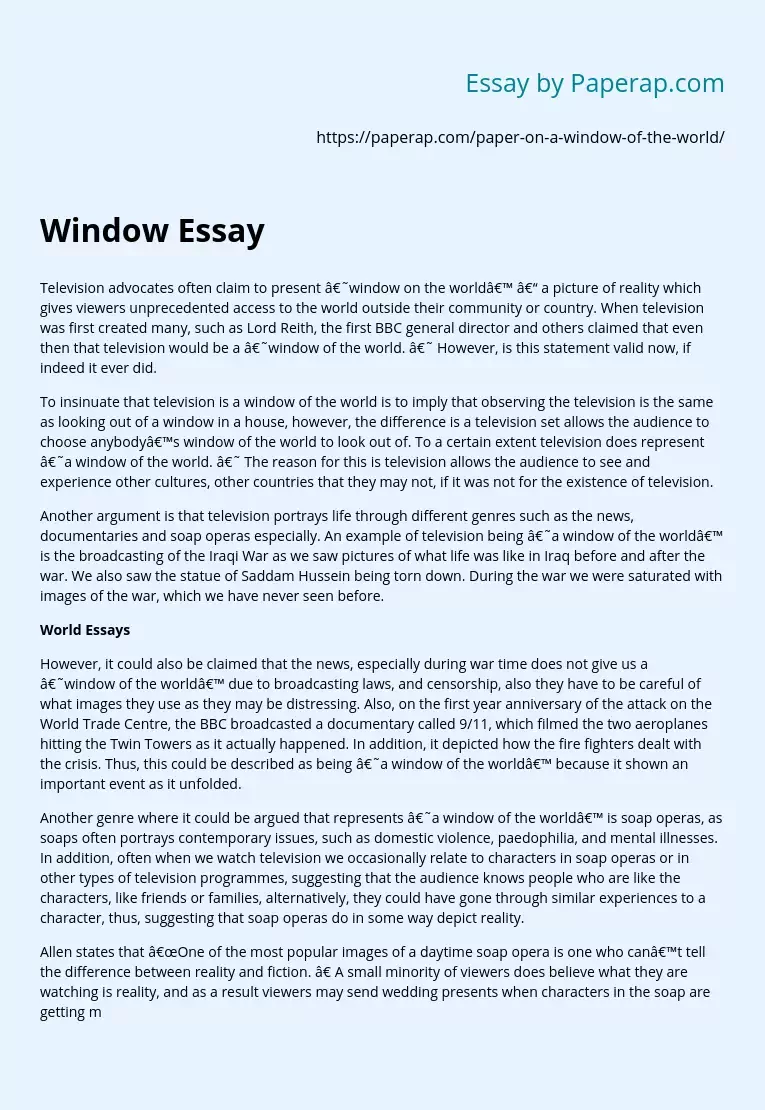TV's Window on the World
Television advocates often claim to present ‘window on the world’ – a picture of reality which gives viewers unprecedented access to the world outside their community or country. When television was first created many, such as Lord Reith, the first BBC general director and others claimed that even then that television would be a ‘window of the world. ‘ However, is this statement valid now, if indeed it ever did.
To insinuate that television is a window of the world is to imply that observing the television is the same as looking out of a window in a house, however, the difference is a television set allows the audience to choose anybody’s window of the world to look out of.
To a certain extent television does represent ‘a window of the world. ‘ The reason for this is television allows the audience to see and experience other cultures, other countries that they may not, if it was not for the existence of television.
Another argument is that television portrays life through different genres such as the news, documentaries and soap operas especially. An example of television being ‘a window of the world’ is the broadcasting of the Iraqi War as we saw pictures of what life was like in Iraq before and after the war. We also saw the statue of Saddam Hussein being torn down. During the war we were saturated with images of the war, which we have never seen before.
World Essays
However, it could also be claimed that the news, especially during war time does not give us a ‘window of the world’ due to broadcasting laws, and censorship, also they have to be careful of what images they use as they may be distressing.
Also, on the first year anniversary of the attack on the World Trade Centre, the BBC broadcasted a documentary called 9/11, which filmed the two aeroplanes hitting the Twin Towers as it actually happened. In addition, it depicted how the fire fighters dealt with the crisis. Thus, this could be described as being ‘a window of the world’ because it shown an important event as it unfolded.
Another genre where it could be argued that represents ‘a window of the world’ is soap operas, as soaps often portrays contemporary issues, such as domestic violence, paedophilia, and mental illnesses. In addition, often when we watch television we occasionally relate to characters in soap operas or in other types of television programmes, suggesting that the audience knows people who are like the characters, like friends or families, alternatively, they could have gone through similar experiences to a character, thus, suggesting that soap operas do in some way depict reality.
Allen states that “One of the most popular images of a daytime soap opera is one who can’t tell the difference between reality and fiction. ” A small minority of viewers does believe what they are watching is reality, and as a result viewers may send wedding presents when characters in the soap are getting married, or may attack a soap villain when they see them on the street. For these people, television is truly a ‘window of the world. ‘ However, it is argued that very few people do behave in this way and can differentiate between reality and fiction.
However, events in soap operas such as Eastenders or Coronation Street happen during a short time span, whereas in real-life it would happen during a longer period of time, and thus cannot represent real-life. Also, in viewers’ lives they have periods of dullness and inactivity, however, this is rare in a soap characters’ life. In addition, soaps sometimes adapt news stories to make into a storyline, for example during the 1980s there were growing incidents of aids, and lead to schedules being saturated with programmes discussing, reporting and analysing the growing Aids crisis.
In addition, the more realistic and grittier soap operas such as Eastenders and Brookside began using it in their storylines. However, it could be argued that television does not represent a ‘window on the world. ‘ The reason for this is because television programmes is constructed of highly selective images of what goes on in the world. Thus, television creates someone else’s view of the world rather than reflecting. Also, television does not represent ‘a window on the world’ because television programmes is acted, and edited. Thus, television is carefully constructed to appeal to the target audience.
In addition, television may represent ‘a window on the world’ for some, however, some programmes may be biased towards subjects such as politics or religion, therefore, and some programmes may not represent everybody’s view without leaning towards one viewpoint. In conclusion this essay has addressed the question ‘To what extent does television represent “a window of the world? ” To a certain extent television does represent ‘a window of the world’ as it portrays real-life events. However, it does not always represent television ‘as a window of the world’ as television can be biased and does not represent everyone’s ‘window of the world. ‘
TV's Window on the World. (2019, Dec 05). Retrieved from https://paperap.com/paper-on-a-window-of-the-world/

